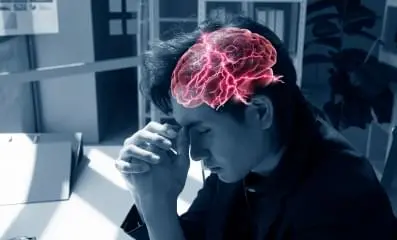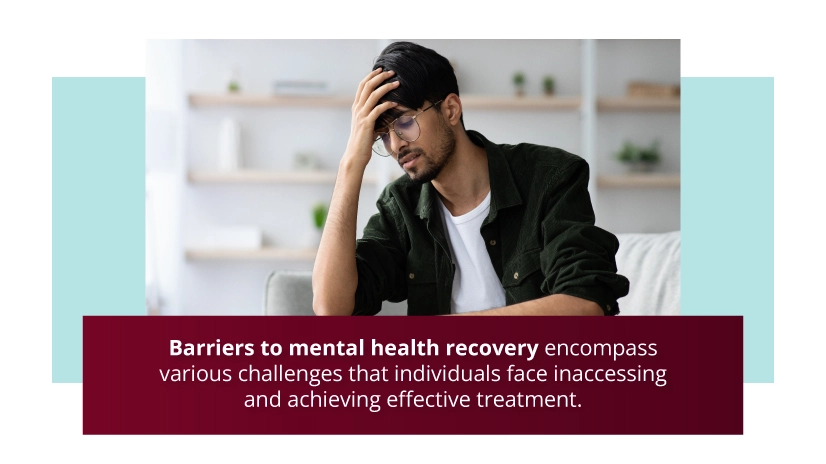
Breaking Down Obstacles to Mental Health Recovery
Clinically Reviewed by:
Mental health recovery is a journey that many people undertake to regain control over their lives. While effective treatments and support systems are available, many individuals still face significant obstacles in their recovery process.
Understanding these barriers can help us create better solutions and support for those in need. In this article, we will explore some common challenges preventing people from achieving mental health recovery.
Key Takeaways
Mental health recovery involves overcoming various challenges to achieve well-being and stability. Here is what this article talks about:
- Financial constraints and lack of awareness are significant obstacles to accessing necessary mental health support.
- Cultural beliefs and limited access to services can also pose challenges in receiving adequate mental health care.
- Internal stigma and digital access issues can impede individuals’ progress in seeking and receiving treatment.
Indiana Center for Recovery offers tailored psychiatric treatment to support your mental health journey. Reach out today at (844) 650-0064.
Understanding Mental Health Recovery
Mental health recovery is the journey of healing and growth for individuals experiencing mental health conditions. It involves finding stability and resilience after experiencing difficulties like major depression, anxiety, bipolar disorder, or trauma. Recovery isn’t just about the symptom relief but also about reclaiming a meaningful life.
- Firstly, it begins with recognizing one’s challenges and seeking support from professionals or loved ones. This support helps in understanding the illness and learning coping strategies.
- Secondly, it involves setting achievable goals that promote personal growth and well-being. This might include managing symptoms, improving relationships, or pursuing hobbies and interests.
- Thirdly, maintaining a balanced lifestyle is essential for achieving mental wellness. This includes exercise, proper nutrition, and relaxation techniques to reduce stress.
- Lastly, building resilience is key. It means developing the ability to bounce back from setbacks and cope with stress. This might involve learning new skills, setting achievable goals, and staying connected.
However, many individuals encounter obstacles that make mental health recovery harder. These barriers can vary widely and might include lack of access to healthcare, stigma surrounding mental illness, or financial difficulties. Addressing these barriers is vital because they can prevent people from getting the help they need to recover fully.
Economic Barriers To Mental Health Recovery
Economic barriers can significantly impact a person’s ability to recover from mental health problems. These challenges often prevent people from accessing the care and support they need.
Cost Of Mental Health Services
The high cost of mental health services can prevent people from seeking the help they need. Therapy sessions, medications, and hospital stays can be expensive, making it difficult for those without sufficient financial resources to afford care. Many people may delay or refrain from seeking treatment due to these costs, which can worsen their mental health conditions over time.
Unemployment And Financial Insecurity
Unemployment and financial insecurity also impact mental health recovery. Losing a job or struggling to make ends meet can cause high levels of stress, anxiety, and depression. Without a steady income, it becomes even more challenging to pay for mental health services. Financial worries can take a heavy toll on a person’s mental health, creating a vicious cycle that hinders recovery.
Insurance Limitations And Coverage Issues
Insurance limitations and coverage issues are another major barrier. Many insurance plans have restrictions on mental health coverage, such as limited therapy sessions or high copayments. Some people may not have health insurance, leaving them to pay out-of-pocket for necessary services. These limitations can make it challenging to access consistent and effective treatment.
Addressing these economic barriers is vital. By making mental health services more affordable and accessible, we can help more people achieve the recovery they deserve.
Educational Barriers To Mental Health Recovery
Educational barriers present significant challenges in mental health recovery, affecting both individuals seeking help and professionals providing support.
Lack Of Awareness And Education About Mental Health
Many individuals face challenges in understanding mental health due to insufficient knowledge and information. This lack of awareness can hinder recovery as it prevents people from recognizing symptoms of mental illness and seeking appropriate help. Without proper education, mental issues may go unrecognized or misunderstood, impacting individuals’ ability to manage their conditions effectively.
Misconceptions And Misinformation
Misconceptions about mental health can lead to misunderstandings and biases. Incorrect beliefs, such as labeling mental illness as a weakness or seeing it as a personal flaw, contribute to stigma. Misinformation perpetuates myths that can affect how individuals perceive themselves or others struggling with mental health issues, impacting their willingness to seek help.
Training And Competency Of Mental Health Professionals
Mental health professionals’ training and skills are crucial in supporting recovery. However, disparities in training and competency levels can affect the quality of care provided. Inadequate training may result in misdiagnosis, improper treatment plans, or a lack of culturally competent care, which can impede individuals’ progress toward recovery.
By addressing these issues, individuals can access timely and effective support, promoting better mental health outcomes across communities.
Cultural Barriers To Mental Health Recovery
Various cultural factors significantly impact how individuals perceive and manage mental health challenges within their communities. Let’s explore them:
Cultural Beliefs And Attitudes Towards Mental Health
Cultural beliefs and attitudes significantly influence how mental health problems are perceived and addressed within communities. Some cultures may view mental illness as a personal weakness or a punishment, leading individuals to avoid seeking professional help. The mental health stigma can prevent open discussions and hinder access to effective treatment.
Language Barriers And Communication Challenges
Language barriers can pose significant obstacles to accessing mental health services. Finding mental health professionals who speak their language fluently can be challenging for those whose primary language is not English. This can hinder effective communication about symptoms, treatment options, and recovery strategies, impacting the quality of care received.
Immigration And Acculturation Stress
Immigrants often face unique stressors related to adjusting to a new culture and environment. This process, known as acculturation, can contribute to increased levels of stress, anxiety, and isolation. Cultural differences in understanding and addressing mental health issues may further complicate access to appropriate care and support services.
Recognizing these cultural barriers and tailoring mental health services accordingly can lead to more effective treatment outcomes and overall well-being.
Structural Barriers To Mental Health Recovery
Accessing effective mental health care can be hindered by several structural barriers that impact individuals’ ability to seek and receive necessary support.
Availability And Accessibility Of Services
Accessing mental health services can become challenging due to limited availability in certain areas. Rural areas, in particular, may have a shortage of mental health professionals and facilities, making it difficult for residents to receive timely care. Additionally, long waiting times for appointments can delay treatment and exacerbate mental health issues.
Geographical Location And Transportation Challenges
The location of mental health facilities and transportation options can create barriers for individuals seeking treatment. People living in remote or underserved areas may face significant travel distances to reach mental health providers. In addition, limited public transportation options or lack of personal transportation can further hinder access to necessary services.
Gaps In Policy And Regulation
Policy and regulatory gaps can create barriers to mental health recovery by impacting funding, insurance coverage, and service delivery models. Inconsistent policies across states or regions may result in disparities in access to mental health care. Additionally, limitations in insurance coverage for mental health services can deter individuals from seeking comprehensive treatment options.
Understanding these structural barriers is essential for advocating for policy changes and resource allocation that prioritize mental health care accessibility.
Personal Barriers To Mental Health Recovery
Navigating the path to mental health recovery involves overcoming various personal barriers that can significantly impact an individual’s journey. Let’s dig into these barriers:
Internalized Stigma And Self-Perception
Internalized stigma refers to the negative beliefs and perceptions that individuals may hold about themselves due to their mental health condition. People experiencing this stigma may feel ashamed or believe they are unworthy of help. These feelings can prevent individuals from seeking treatment and accepting support, hindering their path to recovery.
Lack Of Motivation Or Hope
A lack of motivation or hope can be a significant barrier to mental health recovery. When individuals feel overwhelmed by their symptoms or see little improvement in their condition, they may lose motivation to engage in treatment or make positive changes. This lack of hope can lead to a cycle of despair and hinder progress towards recovery goals.
Co-occurring disorders And Complexities
Many individuals with mental health issues also experience co-occurring disorders such as substance abuse or chronic physical health conditions. Managing multiple conditions simultaneously can complicate treatment plans and recovery efforts. These complexities require integrated care approaches that address both mental and physical health needs to support holistic recovery.
Recognizing and addressing these personal barriers is essential in supporting those on their journey toward mental health recovery.
Technological Barriers To Mental Health Recovery
Advancements in technology have revolutionized mental health care, yet several barriers hinder its widespread accessibility and effectiveness. These challenges may include:
Digital Divide And Access To Online Resources
The digital divide refers to disparities in access to technology and the internet. Many people, especially in rural or low-income areas, may lack reliable internet access or the necessary devices to utilize online mental health resources. This limitation can prevent individuals from accessing virtual therapy sessions, online support groups, or educational materials that could support their recovery.
Privacy And Confidentiality Concerns
Privacy and confidentiality are vital considerations in the delivery of telehealth services. Concerns about data security and breaches of personal information can deter individuals from engaging in online therapy or consultations. Uncertainty about the protection of sensitive health information may lead to hesitation or reluctance in seeking remote mental health support.
Reliability Of Telehealth Services
Telehealth services rely on technology to deliver mental health care remotely. Issues such as poor internet connection, technical glitches during sessions, or inadequate user interface design can affect the reliability of these services. Unreliable experiences may lead to frustration and dissatisfaction among users, impacting their willingness to engage in virtual therapy sessions or seek ongoing support online.
Understanding these technological barriers is crucial for improving access to virtual mental health services and ensuring equitable care for all individuals.
Frequently Asked Questions (FAQ)
What is the biggest barrier to mental health treatment?
Frequently Asked Questions (FAQ)
The biggest barrier to mental health treatment is often stigma. Stigma means negative attitudes or beliefs about something, like mental health disorders. Many people feel embarrassed or ashamed to seek help for their mental health because they worry others will judge them.
This can stop them from talking to a doctor or therapist who could help them feel better. Stigma can also make people feel alone or like their problems aren’t important. Overcoming stigma is essential so that everyone feels comfortable getting the support they need for their mental health.
How can stigma affect mental health recovery?
Stigma can affect mental health recovery by making people feel ashamed or embarrassed about their condition. When someone feels judged or misunderstood because of stigma, they may avoid seeking treatment or talking openly about their struggles. This can delay getting help, which is vital for recovery.
Stigma can also result in feelings of isolation and loneliness, making it harder for people to connect with others who could provide support. Overcoming stigma is vital because it allows individuals to feel accepted and supported, which are key factors in their journey toward mental health recovery.
Mental Health Treatment & Support at Indiana Center for Recovery
Overcoming barriers to mental health recovery from financial constraints and stigma to lack of access can feel overwhelming, but support is available. If you or a family member is struggling with mental health challenges, Indiana Center for Recovery offers comprehensive care tailored to your unique needs.
Our mental health services include evidence-based approaches like cognitive behavioral therapy (CBT), expert medication management, and TMS therapy to help address symptoms and build resilience. When intensive support is needed, our inpatient psychiatric care provides stabilization in a structured environment.
For those dealing with both mental health concerns and substance use, our integrated dual diagnosis treatment addresses both conditions simultaneously, ensuring better outcomes through coordinated care. Family involvement is encouraged through our family counseling programs.
Find supportive treatment at our treatment centers across Indiana or call (844) 650-0064 today to learn how we can help you overcome barriers and begin your recovery journey.







 100% Confidential
100% Confidential
